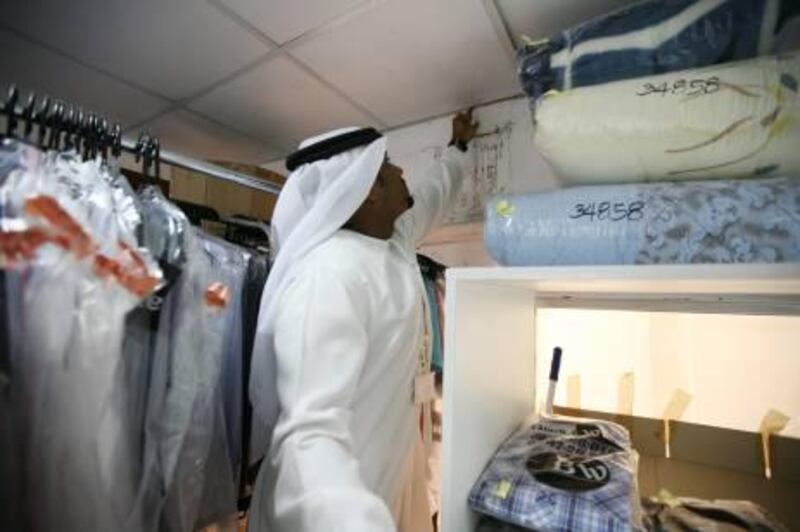ABU DHABI // "You see this area?" Obaid Al Zaabi asks driving along Khalifa bin Zayed Street. "In the front, you see it's clean. But when you go inside, you will see the difference."
The public health inspector looks for a place to park.
"I will show you," he says. During the next hour, he finds dirty walls, broken tiles, a hidden compartment where salon workers once slept and a cargo shop with a towering pile of boxes and rubbish.
Mr Al Zaabi, 36, from Abu Dhabi, roams the city each day in a crisp kandura, looking for unsanitary conditions in shops and salons and other offences, such as littering and public spitting.
"There are some, when they know we are here in the area, they close their shop and they run away," he says, laughing.
The municipality's 125 public health inspectors issued 23,823 fines in 2011, compared with 9,363 in 2010.
It is not that the city is dirtier, says Khaleefa Al Romaithi, the director of public health for the municipality, but that there are more eyes searching for problems. The department hired additional inspectors in 2011 and plans to hire more soon, he says.
A former stockbroker who joined the municipality after the market crashed, Mr Al Zaabi starts work most days at 7.30am. He walks through neighbourhoods, checks complaints from residents, reviews licence renewals for salons, laundries and other shops and pops by to surprise store owners.
Even when he is off duty, he watches for offences, he says. "I see something wrong, I stop and write it up."
After one year in the job, he has learned to treat offenders with respect. "They say, 'Why is it wrong? I have been doing it this way for 10 years'," Mr Al Zaabi says. "They need time to know what are the right or wrong things."
On Thursday he begins at Salon 2000, a shiny men's salon. He shakes hands with the owner and inspects the sterilising stations. All clear.
At Black & White Dry Cleaning next door, workers iron clothing on clean white bedsheets. But Mr Al Zaabi notices a dirty wall. "They have to do maintenance here," he says. He spots a first aid kit on another wall.
"See like this?" he says, wiping dust away.
As he writes out a warning, the workers smile nervously.
"Small things … " Mr Al Zaabi assures them. "I will show you."
He cleans dust from light switches with a tissue.
"And you have to fix this one," he says, pointing to the side of the staircase, which is missing a large tile.
"And see here?" he says, bounding around a corner, wiping the floor.
Later, Mr Al Zaabi inspects a minuscule barbershop, Salem Hairdressing Saloon.
He prods the ceiling with a broom - revealing a small attic - then takes off his shoes and climbs on a cabinet to peer inside.
Men used to sleep above the ceiling there, a hazardous arrangement the municipality is trying to eradicate. The salon owner uses the area for storage now. "I can't give him a fine for that because he has no space," Mr Al Zaabi says.
Still, the owner is likely to lose his licence when it comes up for renewal because the salon is not large enough, Mr Al Zaabi says, adding that the owner's choice is to move or close shop.
Deeper in the tangle of side streets, Mr Al Zaabi enters Jasim Air Cargo Est. In the back room, a pile of luggage, boxes, newspapers, empty water jugs and rubbish nearly reaches the ceiling.
"Every day, we are facing places like this," Mr Al Zaabi says. "When we go back home, the first thing they say is go to the toilet and take a shower."
Mr Al Zaabi writes the owner a warning.
"If I come in two weeks, he is trying to clean it up, I give him more time," Mr Al Zaabi says. "If he has done nothing, I will give him a fine."
When Mr Al Zaabi returns to his office that afternoon, a man is arguing in the reception area.
Inspectors have told him to move or reduce activities at his 40-square-foot decor shop, required to have 100 square feet, Mr Al Zaabi says.
"Sometimes the people, they shout at us," he says. "But we cannot shout back, because this is our job."
He settles in for a cup of coffee, his kandura still pristine.






